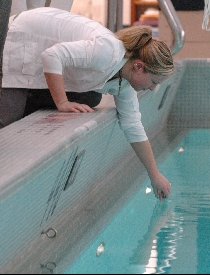Community Health Class Provides Community Service, Hands-On Experiences
April 25, 2006

Stephanie Linane, a graduate health education student, collects water for testing from the Student Recreation Center Pool.
[Download Print-Quality Image]
MACOMB, IL Did you know that when you enter a swimming pool, an extremely strong scent of chlorine is actually an indicator that the pool isnt really clean?
Western Illinois University health sciences students enrolled in professor Fetene Gebrewolds Community Health 417 class, Practicum in Public Health Sanitation, are learning facts such as that in the classroom, and then taking their knowledge into the community to apply what they are learning.
Two of Gebrewolds students, Chris Adams, a senior from Macomb (IL), and Kyle Lorts, a junior from Bethalto (IL), said that the class is giving them relevant hands-on experience which will help them move into the job market quickly after graduation. Adams, Lorts and their classmate, Stephanie Linane, a graduate health education student from Elburn (IL), recently conducted an analysis of the Donald S. Spencer Student Recreation Center swimming pool under the director of Dr. Ashok Gokhale, a swimming pool inspector from the Illinois Department of Public Health. According to Gebrewold, the recreation center pool passed the inspection with flying colors.
When sanitation professionals inspect swimming pools, they are looking at the pools chemical levels, the water quality and the facility, Lorts explained.
Adams added that chemical levels and water quality must be maintained in order to avoid waterborne diseases, such as E. coli.
When people go into a pool and can really smell the chlorine, thats an indicator that the pool really isnt clean, Adams said. That strong scent means theres actually not enough chlorine. It only smells strong because the chemicals are mixing with things such as perspiration and urine. These are the pools that need to be shocked to even out the chlorine levels and properly treat the pool in order to avoid contaminators.
In addition to inspecting the recreation center pool, the class also paid a visit to Tattoo Blue in Macomb. Tattoo parlors in the state of Illinois must follow operational procedures and health department regulations, which are then regularly inspected, Lorts and Adams explained. The Macomb parlor passed the inspection and was deemed safe for consumers.
Restaurant inspections, under the guidance of McDonough County Health Department officials, are also part of the students practical experiences. The class recently inspected a Western residence hall dining room to learn more about food sanitation practices and guidelines. Again, the inspection revealed that the facility was operating under set guidelines and passed inspection.
Both Lorts and Adams said they were drawn to this class to gain more experience in practical settings.
I decided that occupational safety was my area of interest and I selected the health sciences department because of the broad experiences it offers its students, Lorts, who hopes to work as a safety analyst for a construction company following graduation, added. This class, and this major, has provided me with lots of hands-on opportunities.
Adams, whose passion is the outdoors and the environment, is currently securing a Summer 2006 internship. His goal is to work for the Environmental Protection Agency or the environmental health division of a state or federal agency.
Because of this major and the experience were already getting, Ive really had my choice of internship sites, he said. Ive found that agencies and organizations have been really receptive after I tell them the various experiences Ive already had.
Gebrewold added that the demand for community health majors, as well as health services management majors, is growing and there are often more jobs than there are professionals.
Students in our community health option can study community health education or environmental health. We offer emergency medical technician training courses, as well as courses in human diseases, public health, environmental science and many more areas, he explained. Our graduates have definitely been successful in securing employment after graduation.
Westerns health sciences option in health services management includes concentrations in long term care administration, private sector health services (hospitals, managed care organizations, etc) and public health management.
The next experiences for the trio from CH 417 include a tour of Macombs wastewater facility to learn how water is treated before it is discharged into lakes and other bodies of water, followed by a lesson in radon awareness.
For more information about health sciences at Western, contact the department at 309/298-1076 or visit www.wiu.edu/health.
Posted By: Darcie Shinberger (U-Communications@wiu.edu)
Office of University Communications & Marketing

Connect with us: